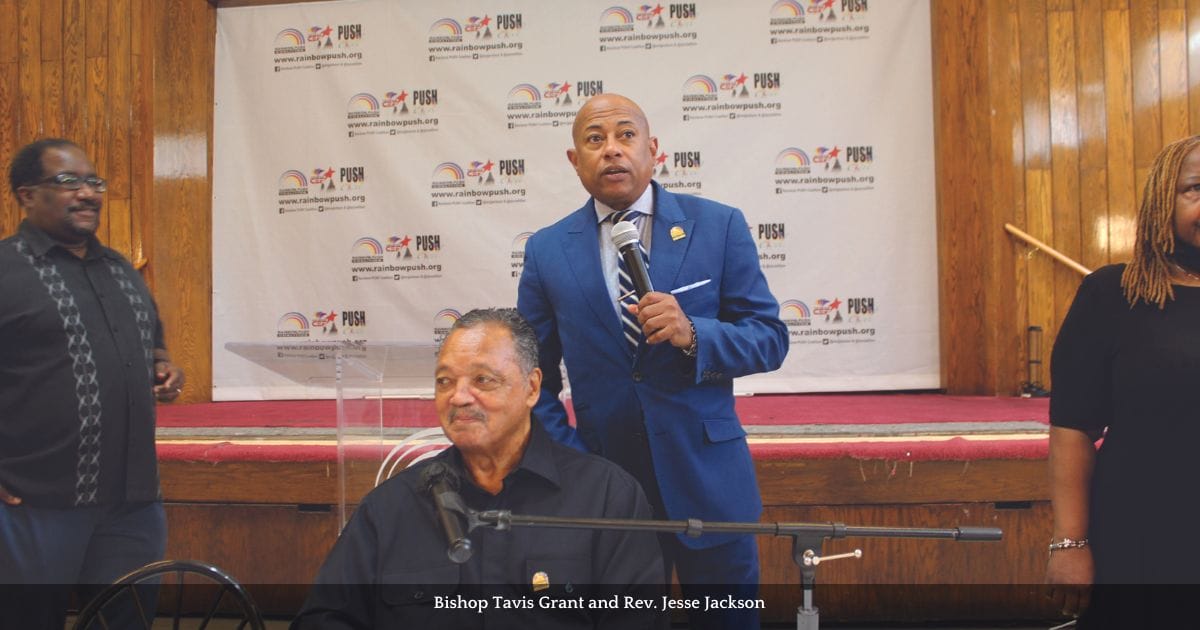On Saturday, November 19, at the Rainbow PUSH Coalition, supporters joined Reverend Jesse Jackson and Bishop Tavis Grant, national acting executive director for the civil rights organization, in a fight to get the Biden student loan debt program released.
At issue is a Trump-appointed Texas judge who has blocked Biden’s student loan forgiveness program, claiming that it failed to provide borrowers an opportunity for public comment.
Jackson has reached out to various bar associations and community groups to help prepare a plan to challenge the judge’s stay that already has blocked millions of students who have already applied for the student loan debt relief program.
“Reverend Jackson will be focusing his attention on student loan debt relief,” Bishop Grant said.
Referring to Texas U.S. District Court Judge Mark Pittman, who blocked the student loan program, Grant said the judge’s stay blocks “much needed debt relief to millions of borrowers across the country who have been victims of predatory lending and unscrupulous collection agencies.”
In issuing his stay, Judge Pittman said the student loan forgiveness program is “unlawful,” because Biden failed to follow federal procedures to allow public comment before he announced the program’s benefits. These borrowers had a problem with the program’s eligibility criteria and their lawsuit alleged that they could not voice their disagreement.
This was the second attack on Biden’s loan forgiveness program, the first being the U.S. Court of Appeals for the 8th Circuit, which had temporarily halted the program last September on behalf of a lawsuit filed by six Republican-led states.
Those states were Nebraska, Missouri, Arkansas, Iowa, Kansas, and South Carolina. They argued that Biden’s plan violates the separation of powers and a law that dictates how federal agencies can write regulations. They also argued that Biden didn’t have the power to launch such a student debt forgiveness program.
Biden’s student program was challenged last October by the Job Creators Network Foundation on behalf of two borrowers who reportedly don’t qualify for all of the program benefits.
“It is so very vital to the recovery of our economy to provide the same relief that you gave to banks, that you gave to the airline industry, that you gave to the automobile industry, that you gave during the time of the pandemic as it relates to the stimulus,” Grant pointed out.
“The stimulus lifted 30 percent of Black and brown children out of the cycle and the debts of poverty. This measure in one stroke of the pen produces an opportunity for Americans of all walks to receive much needed debt relief at a time when interests rates are soaring, wages have stalled and inflation is becoming a reality for the American consumer,” Grant explained.
Jackson is appealing to those who have been hardest hit by this “scourge of economic hijacking to join him Saturday to let your voices be heard, your faces seen, and your pain felt because Reverend Jackson intends to launch a full court press to fight for student loan debt relief. It must happen. It must not be delayed, and these persons cannot be denied,” said Grant.
But Texas Governor Greg Abbott signed a letter claiming that the Biden student debt loan forgiveness program harms the working class.
Under the Biden student loan forgiveness program, those earning over $125,000 are not eligible for the loan relief program. Those who are eligible are limited to $10,000 in relief, that is, unless they are recipients of Pell Grants that are intended for low-income students, where they can get up to $20,000 in relief.
According to the Texas Higher Education Coordinating Board, the President’s student loan forgiveness program to low-income students who qualified for federal Pell Grants would especially impact low-income borrowers and people of color, students the Board believes would be more likely to qualify for federal financial aid and carry higher amounts of student loan debt.
One of the plaintiffs, Alexander Taylor, is reportedly not eligible for $20,000 in student loan forgiveness because he didn’t have a Pell Grant, leaving him to be entitled only to $10,000 in loan forgiveness.
Another plaintiff, Myra Brown, had a private loan that is no longer covered by Biden’s program. However, Brown did have a federal loan forgiveness program being the owner of Desert Star Enterprises, Inc.
According to The Intercept report, Brown’s company received a $48,000 business loan where $42,997 was forgiven last April as part of the Paycheck Protection Program.
In responding to the lawsuit, the U.S. Justice Department argued that Biden’s plan does not require notice and comment. After the Texas ruling, the Biden administration ceased taking applications for the student debt forgiveness program.
“We are seeking to overturn those orders,” the Department of Education said on its website.






